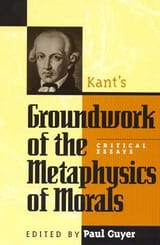Anonymous
7/25/2025, 11:34:22 PM
No.24582216
[Report]
>>24582340
>>24582370
>>24582399
>>24582416
>>24582483
Today I read Kant's "Groundwork of the Metaphysics of Morals." I heard it was a tough read, and holy shit. I think I understood the gist of it, although there is a particular point that either Kant failed to explain or I simply did not understand. Starting from the premise that we should rely on reason alone (i.e. not sensory experiences) to reach conclusions about ethics, he seemingly concludes that the most ethical rule is that which could be a universal law (i.e. a rule is ethical if you would have everyone follow it at all times independently of context). I don't see how that follows.



